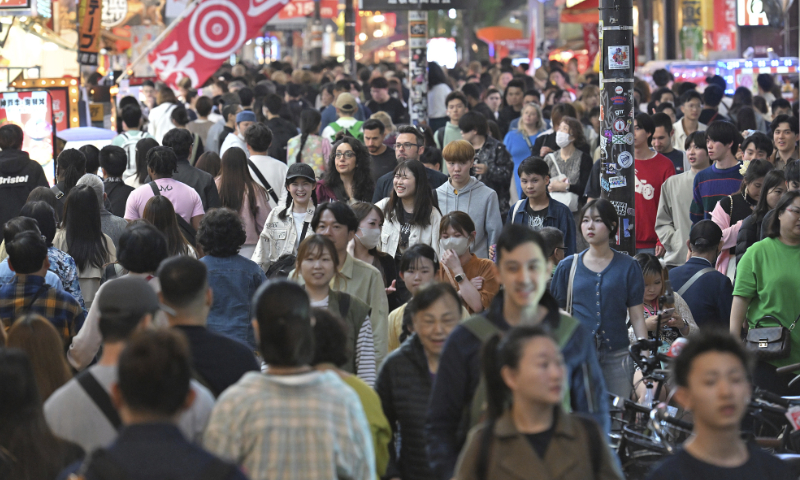Plummeting Japanese yen turns country into 'shopping paradise,' drawing Chinese tourists

A crowd of people in Namba district, a hustle-bustle area in Osaka Prefecture, Japan on April 27, 2024. Photo: VCG
The Japanese yen hit a 34-year low against the dollar on Monday, but the weak currency has turned Japan into a shopping paradise, with a large number of international tourists flocking to the country to take advantage.
Among the tourists, wealthy Chinese shoppers have been splashing out on luxury items in Japan.
According to the Xinhua News Agency, the Japanese yen briefly dropped to a new 34-year low of 160 yen to the US dollar on foreign exchange markets on Monday morning. This marked the first time since April 1990 that the US dollar has topped the 160-yen line.
With the continuous depreciation of the yen, the prices of some high-end products in Japan have become much lower than in China, attracting a large number of tourists looking to score some great deals.
Data that Chinese travel platform Qunar sent to the Global Times on Monday shows that as of Sunday, Tokyo and Osaka ranked second and third respectively in terms of searches on the platform, following Bangkok. The search index for Tokyo increased by 207 percent year-on-year, while for Osaka it increased by 172 percent. Hotel bookings in Japan for the upcoming May Day holidays have increased by 3.5 times compared to 2023 on the platform.
A Chinese tourist surnamed Chen who just came back from Japan on Sunday told the Global Times that the major shopping malls were filled with Chinese people.
"If you didn't know any better, you would think you were in a mall in China. Especially at the LV counter, there were long lines outside," Chen said.
For example, an Onthego small handbag from LV costs 25,600 yuan ($3,533.8) in China, but only 47,520 yen in Japan, which is about 21,753 yuan. Therefore, Chinese customers can save nearly 4,000 yuan.
The depreciation of the yen has also led to a surge in demand for the surrogate shopping business, known as daigou, with some shopping agents estimating they can earn up to 10,000 yuan on a trip to Japan.
A daigou shopper surnamed Sun said this has been her busiest time in many years. Sun said she had received 50 orders during the last few weeks. "They asked me to buy them products including luxury handbags, game consoles, cameras, and cosmetics," Sun added.
According to Sun, buying items in Japan is very cost-effective given the high markups in China for goods such as handbags and cameras. She charges a 10 percent shopping fee, so a 20,000-yuan bag can earn her 2,000 yuan.
Although there are risks involved with daigou, such as people only being able to bring back one bag per person and having to remove the tags to avoid customs taxes, the business is still popular.
According to multiple posts on Chinese social media platform Xiaohongshu, which compares prices between luxury handbags in Japan and China, Louis Vuitton's Carryall takes the top spot for the biggest price differential.
The South China Morning Post reported on Monday about the first-quarter results for LVMH, the world's largest luxury group. Overall revenue in Asia, which is dominated by the Chinese market, has declined by 6 percent, but in Japan sales have surged 32 percent.
The report said that global sales of fashion and leather goods - LVMH's biggest business - to Chinese customers in their home market and abroad rose 10 percent, indicating that spending by Chinese tourists overseas helped offset weak sales at home. A large portion of their spending abroad was in Japan.
The Global Times found on Xiaohongshu that there have been many posts searching for or offering personal daigou services in Japan during the upcoming May Day holidays.
The plunge in the yen has also increased the appeal of Japanese commercial property.
The Global Times learnt that many Chinese investors are eyeing residential properties, including those in the Tokyo Olympic Village.
However, the depreciation of the yen also creates some problems. It may exacerbate the deflation issue in Japan, and excessive dependence on overseas tourists' consumption may expose the Japanese economy to external risks, according to insiders.

